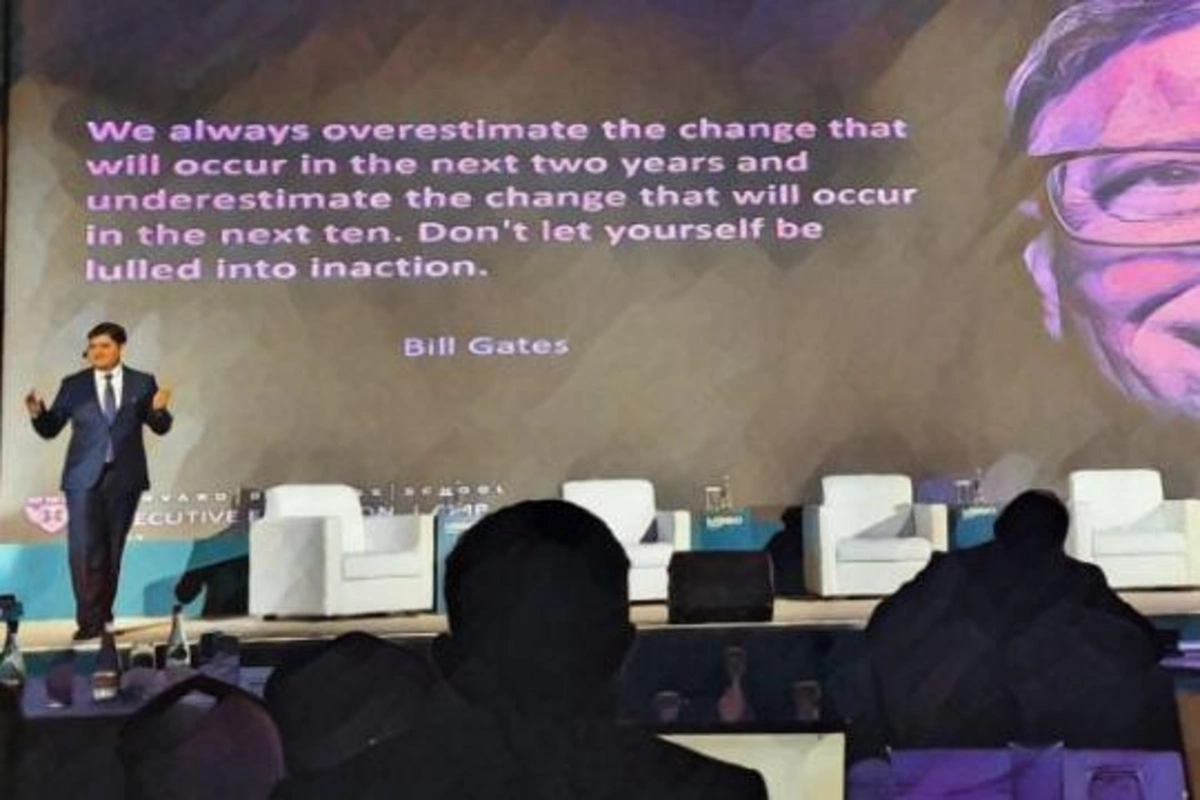
Ozodkhon Davlatshoev, CEO of Tcell in Tajikistan; image: TCA, Sadokat Jalolova
The second day of the GSMA M360 Eurasia conference highlighted themes of partnership, innovation, and future-focused digital strategies.
Leaders from Kazakhstan, Uzbekistan, and Tajikistan, along with delegates from various countries, exchanged insights on building resilient digital economies through collaboration and technology, The Caspian Post reports citing foreign media.
Kazakhstan: Digital Leadership and AI Strategy
Kazakhstan’s Minister of Digital Development, Innovation and Aerospace Industry, Zhaslan Madiyev, highlighted his country’s digital advancements. Over the past decade, Kazakhstan has ascended into the global top ten for online service quality and now ranks 24th in e-government development. “More than 90% of transactions are cashless,” he noted, “and over 35 personal documents are exclusively digital. Digital documents now carry the same legal weight as paper ones.” Citizens can even travel domestically using only a digital ID on their phones.
Madiyev spotlighted Astana Hub, Kazakhstan’s primary IT cluster, which hosts over 1,600 startups and global tech firms, with outposts in Silicon Valley, Singapore, Saudi Arabia, and the UK. “We recently signed an agreement with Uzbekistan’s IT Park,” he said, “and we will soon open a joint mobile lab with Tcell in Uzbekistan.” He emphasized that cross-border collaboration enables startups to access global markets.
Artificial intelligence (AI) featured prominently in Madiyev’s address. He announced the formation of a national AI committee and the adoption of a five-year strategy that includes ethical guidelines, product labeling, and a public AI platform. A newly acquired supercomputer, boasting two exaflops of processing power, will soon support universities, startups, and companies. Kazakhstan also plans to train one million individuals over five years, spanning schoolchildren to government employees. Madiyev invited Uzbekistan to join a regional AI collaboration centered around the forthcoming International Center of AI in Astana, which will host labs, exhibits, hackathons, and workspaces for startups and major tech firms.
Uzbekistan: Building a 5G Future
In an interview with The Times of Central Asia, Dmitriy Shukov, CEO of Perfectum, the first stand-alone 5G mobile network operator in Uzbekistan, discussed the company’s vision. Perfectum primarily serves the business sector with advanced network solutions. “We focus on B2B clients and will continue to develop cutting-edge services for a fast-growing economy,” Shukov stated.
On expanding 5G access nationwide, Shukov pointed to device compatibility. “People need access to 5G stand-alone service. We hope GSMA can facilitate discussions with handset manufacturers to unlock all 5G features here,” he said, underscoring that broader access is essential for digital inclusivity. Perfectum’s pioneering role in the region sets a benchmark for others.
Discussing Uzbekistan’s telecom infrastructure, Shukov expressed optimism. “Our population grows by 700,000 annually. Sixty percent are under 30, demanding high-speed, low-latency services. And the regulatory environment is now very favorable to investors,” he said. These dynamics, he concluded, set a strong foundation for the next three years.
Tajikistan: Rethinking Telecom Models
Tcell CEO Ozodkhon Davlatshoev, whose company serves over two million customers and is Tajikistan’s largest mobile operator, addressed the pressures facing the sector. “Our market share is about 14%, growing 7% annually, but with just 2% population growth, we add only around 60,000 new users per year, while investing millions to maintain infrastructure,” he said. He also noted rising competition and regulatory pressures to lower prices.
Davlatshoev advocated a shift from merely providing access to delivering value-added services. “Being just a gatekeeper is no longer viable. We can leverage our data and networks to offer personalized services, financial tools, even advertising,” he said. His vision includes expansion into fintech, digital advertising, and social media, which he claims has already yielded ten-fold increases in EBITDA in pilot regions. “Let’s make customers richer, not just our companies,” he quipped.
Pakistan: Financial Inclusion Through Digital Innovation
Murtaza Ali, President of JazzCash, highlighted Pakistan’s push toward digital finance. As one of the country’s leading mobile financial platforms, JazzCash serves over 20 million monthly users and collaborates with more than 285,000 agents and 485,000 merchants.
“Almost 40% of adults in Pakistan are unbanked,” Ali said. “We built a system that reaches people wherever they are.” JazzCash offers not just money transfers, but also micro-loans, insurance, and Shariah-compliant savings tools. In 2024 alone, it issued around 143,000 digital loans daily and insured two million individuals.
Ali emphasized the role of partnerships, with the government, Google Wallet, and retail providers, in driving financial inclusion. “We support government payment systems and are the only fintech in Pakistan compatible with Google Wallet,” he noted. As part of VEON Group, JazzCash collaborates with Simply in Kazakhstan and Beepul in Uzbekistan. Together, they processed over $40 billion in transactions in the past year.
Summit Takeaways: Cooperation and Shared Vision
Throughout the event, a consistent theme emerged: the need for cooperation among governments, telecom providers, and fintech innovators. From Kazakhstan’s AI strategy and Uzbekistan’s 5G ambitions to Tajikistan’s evolving business models and Pakistan’s digital finance breakthroughs, the shared goal was clear, deliver fast, affordable, and inclusive digital services.
By the close of May 22, participants had agreed on key objectives: bridging coverage gaps, supporting startups, advancing AI capacity, and strengthening regional partnerships. Working groups were established to address AI ethics, 5G deployment, and cross-border startup collaboration.
Share on social media